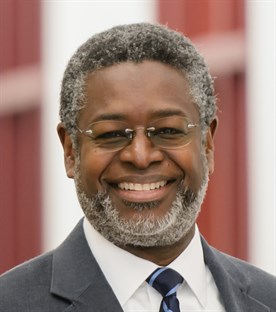 Anthony Guiseppi-Elie, TEES professor and head of the Department of Biomedical Engineering at Texas A&M University, has been named a Fellow of the Institute of Electrical and Electronics Engineers (IEEE) for his contributions to organic electronic materials in biotechnology and biomedicine.
Anthony Guiseppi-Elie, TEES professor and head of the Department of Biomedical Engineering at Texas A&M University, has been named a Fellow of the Institute of Electrical and Electronics Engineers (IEEE) for his contributions to organic electronic materials in biotechnology and biomedicine.
IEEE Fellow is the highest grade of membership and is recognized by the technical community as a prestigious honor and an important career achievement. The grade of Fellow is conferred by the IEEE Board of Directors upon a person with an outstanding record of accomplishments in any of the IEEE fields of interest. The total number selected in any one year cannot exceed one-tenth of one percent of the total voting membership.
“It is a rare privilege to be honored by one’s peers in this way; I am delighted to join other IEEE Fellows as standard bearers for our organization,” Guiseppi-Elie said.
Guiseppi-Elie’s research interests are in engineered bioanalytical microsystems in the service of human health and medicine, and he has been principal investigator on more than $20 million in funding of sponsored programs, gifts, and contracts including a recent $3,280,000 award from the U.S. Department of Defense.
His research uses intrinsically conductive polymers combined with synthetic hydrogels and natural biopolymers to engender biologically active and responsive interfaces in biosensors, implantable electrodes and soft implantable electronics. With more than 145 peer-reviewed publications, eight book chapters and eight patents, Guiseppi-Elie is a recognized international expert in his field.
He is a Fellow of the American Institute for Medical and Biological Engineering and the Royal Society of Chemistry, a lifetime member of the American Institute of Chemical Engineers and holds memberships in the American Association for the Advancement of Science, the American Chemical Society, the Materials Research Society and the Biomedical Engineering Society.
Guiseppi-Elie has been an IEEE EMBS distinguished lecturer and the past year was selected for a Fulbright Specialists project at Universidad Nacional de Tucumán (UNT), Facultad de Ciencias Exactas y Tecnología (FACET) in Argentina.
Prior to joining Texas A&M, Guiseppi-Elie served as professor of life sciences and chemical engineering and professor of emergency medicine at Virginia Commonwealth University/Medical College of Virginia and later as professor of chemical and biomolecular engineering, professor of bioengineering, and professor of electrical and computer engineering at Clemson University where he was the Dow chemical professor and directed the Center for Bioelectronics, Biosensors and Biochips.
IEEE is the world’s leading professional association for advancing technology for humanity. Through its 400,000 members in 160 countries, IEEE is a leading authority on a wide variety of areas ranging from aerospace systems, computers and telecommunications to biomedical engineering, electric power and consumer electronics.
Dedicated to the advancement of technology, IEEE publishes 30 percent of the world’s literature in the electrical and electronics engineering and computer science fields, and has developed more than 900 active industry standards. The association also sponsors or co-sponsors nearly 400 international technical conferences each year. For more information about IEEE or the IEEE Fellow Program, visit www.ieee.org.
About the Department of Biomedical Engineering
Committed to solving the world’s greatest health problems through the exploration of new ideas, integrated research and innovation, the Department of Biomedical Engineering at Texas A&M is producing the next generation of biomedical engineers, developing new technologies and new jobs, and achieving revolutionary advancements for the future of health care. The department has unique strengths in regenerative medicine, medical augmentation, molecular diagnostics/theranostics, tele-health, and precision medicine, and its faculty members are internationally recognized with collaborative relationships that span engineering, physical and natural sciences, medicine and veterinary sciences.